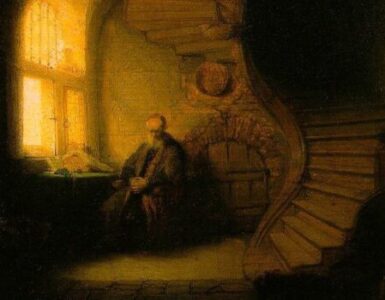The intuitive mind is a sacred gift and the rational mind is a faithful servant. We have created a society that honors the servant and has forgotten the gift. – Albert Einstein
American culture, dating from the 17th century, has been shaped by Judeo-Christian values and traditions. These values and traditions emphasize the reality and sacredness of spiritual transcendence. There also developed in America a cultural understanding of sacredness as that which is precious to us as Americans—examples including the flag, the anthem, the Declaration of Independence, or the Statue of Liberty. Today, however, many Americans struggle to identify what (if anything) they consider sacred in their lives. This essay is about the loss of the sacred, both spiritually and culturally, in America—and the need to recapture it.
The idea of the sacred is ancient in human societies; it is an important dimension of all cultures. Usually associated with transcendence, it is typically conceived through tradition, along with its writings, rituals, prayers, observances, and customs. The defining idea is that there are aspects of our experienced world that are to be regarded with reverence and great respect.
Psychologist Rick Hanson, senior fellow at the Greater Good Center at UC Berkeley, writing in Psychology Today, asserts that the concept of “the sacred” has two meanings: one relating to the spiritual, the other to something precious (as alluded to in our introduction). Let’s explore these two meanings of the sacred against the context of what Americans are at risk of losing: our very sense of who we are.
Hanson points out that when it comes to “the sacred,” humans experience two unique and complementary aspects: first, “a treasure, a warmth, a mystery, a light, and a profound refuge” and second, that the experience “contains an implicit stand that there are things that stand apart in their significance to you.” Hanson’s comments suggest that whatever is construed as sacred has an innate and sublime quality of what it stands for. It is something that is to be respected and associated with that which transcends the ordinary.
Whatever is regarded as sacred in a culture (whether spiritually or as something precious to us) is approached with reverence, respect, and humility. In the ancient world, I would add that it arose from a sense of trepidation, wonder, and mystery.
Each of us regards something as sacred; yet, in America, we seem to be losing a sense of relatedness to that which we hold sacred or precious.
We experience a “sense of relatedness” even between ordinary human existence and transcendence, not only between our ordinary experience and our experience of that which is precious to us. This sense of the sacred, this sense of relatedness is an acknowledgement of that which is greater than the self but not completely separate from it either. In some sense of the term, the sacred can be that which the self feels compelled to embrace, to raise up—the ideal of justice, the virtue of honor, the nobility of human dignity, or reverence for the divine. A multitude of cultures throughout the millennia have cherished (each in their own way) ideals, customs, and traditions deemed sacred to them.
It is unusual, perhaps even strange, for a culture to lose sacred customs it once cherished. But isn’t that what is happening in America? What do we hold as sacred today? Is anything considered sacrosanct?
There was a time when “Stars and Stripes” or even the national anthem was deemed at least worthy of respect, if sacrality is too lofty an ideal. But that perception can no longer be taken for granted. Refusing to stand for the anthem (the “take a knee” movement in sports) illustrates the point.
Customs and traditions once held sacred in America are being invalidated and replaced. Postmodernism’s rejection of objective truth undermines the sacredness, the very reality of truth (something which can only be objective) and subverts our education systems, among much else. DEI initiatives have fostered disrespect for the authority of parents, our national heroes, and the legacy of our founding fathers. Monuments to the latter have been defaced and torn down. Our history (whether one likes this or that part of our past or not) is being decimated before our very eyes.
Unfortunately, religious heritage and morals, Christian, Jewish, Islamic, Hindu, or otherwise, fare no better. Pew Research reports that in 2021 the fastest growing segment of religious sentiment in America was a relatively new grouping called “nones,” (none of the above).
Yet, there is something even more egregious than the assaults on that which we hold sacred or precious; the baseness and mediocrity that characterizes so much of contemporary culture reveals a “dis-ease” of mundaneness in America. Very little is taken seriously by us today. Anything and anyone are fair game for ridicule.
For many Americans perhaps, the idea of the sacred has never been part of their consciousness—conditioned as we are in the secularism of the last sixty years. Many Americans are ensconced in a vast web of consumerism and the habitual behavior of immediate gratification, locked in by our tight hold on our electronics.
We owe these untoward circumstances in large measure to the postmodernist movement—a philosophical complex of thought replete with relativist and physicalist mantra. Here’s why this is a problem: a physicalist view of reality is that since everything is composed of the same “stuff,” nothing is “set apart.” So why should a hero’s death be revered more than anyone or anything else? From the standpoint of chemistry, it’s all the same atoms, just configured differently. Moreover, from a physicalist standpoint, the ideals we say we value, like love and the virtues—temperance, courage, wisdom, and justice—are merely the biological effects of sequenced chemical reactions in our gray matter. They have no inherent or transcendent quality, so we ask again: what is there to revere?
But here’s the thing.
Pagan though they were, ancient cultures acknowledged realities beyond the thoughts of individual humans, forces greater than any command of a human. Sacred writings of the ancient cultures of Egypt, Greece, and Rome reveal that they understood human limitations—we are not the fashioners or masters of the cosmos. To have a sense of the sacred, one must be prepared to accept the reality of that which transcends human finitude and yet, is the sufficient reason for why there is something rather than nothing—why the universe is rather than is not—namely, God. But this acceptance comes only through humility.
Humility, therefore, necessary to experience a sense of the sacred in our lives, is being lost in America—supplanted by a “haughty spirit” of our scientific and physicalist conditioning. Proverbs 11:2 couches it this way: “Pride leads to disgrace, but with humility comes wisdom.”
There is a question before us as Americans: What is to become of a society that has lost its sense of relatedness to that which it holds as spiritually sacred or culturally precious? What is there to preserve, to defend, to fight for? What do we mean when we say “I am an American”?
Photo by Paul Weaver on Unsplash













